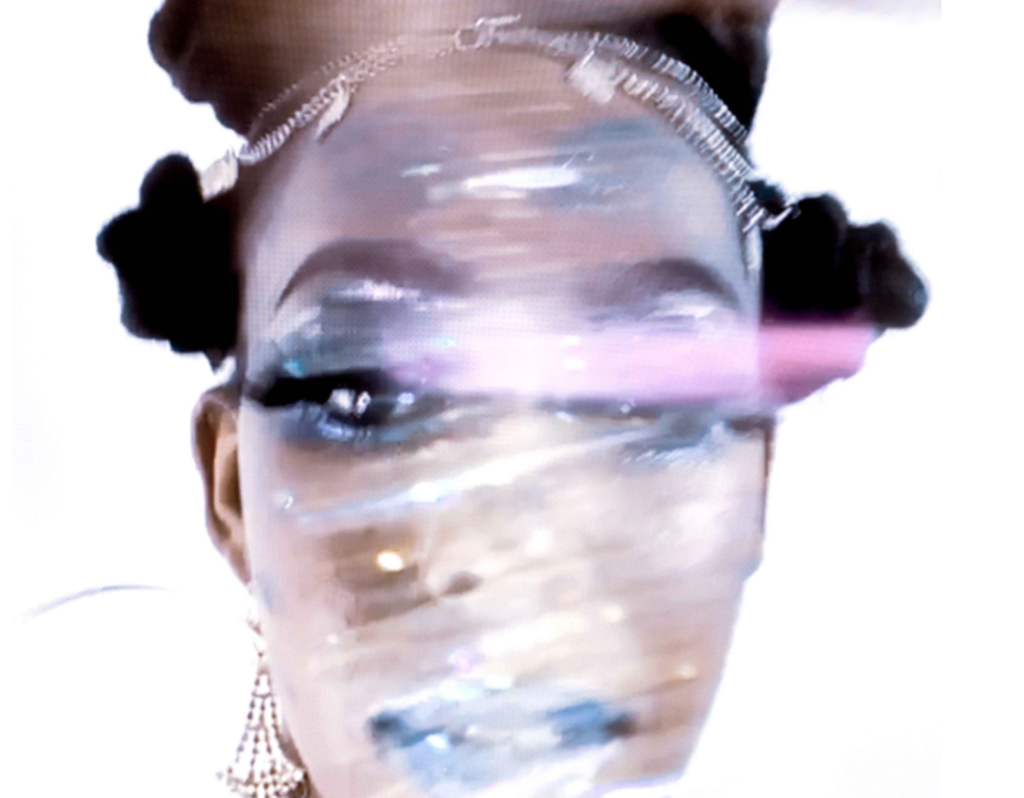Words by Crystal Mioner

Photo by Jayne Lies
We’re locked in a dream state, a version of Detroit that’s real and unreal, and what Ahya Simone describes as “an iridescent reality”. Blue tinges everything, blurring the sky and the mouths of Ahya and her friends, fellow artists Supercoolwicked and Kesswa. The forthcoming video for Frostbite, directed by Jayne Lies, provides an experimental slant to the spaces created with the homegirls versus the space we inhabit alone. In this, her debut single and subsequent video release made by the audiovisual label Pique, Ahya finds her release from the confines of isolation.
Frostbite was written three years ago after a period of personal trauma that Ahya remembers being full of days spent in bed. “Frostbite came around as a way to speak to that feeling of isolation, when you don’t feel like you have people who care about you, or the people who care about you are out of your life,” she says. It was after the death of two of her aunts, the end of a job, and her first time living alone that Ahya gave voice to the process of change and heartbreak.
The song begins with a tender progression of notes, before Ahya’s delicate mezzo-soprano fills the room, reverberating in time with twinkling bursts from her harp. It’s grounded by the initial progression but Ahya isn’t afraid to experiment with different effects, a key reason for her stepping away from the path of traditional harp players, confined to an orchestral pit. “I wanted to play R&B music and experimental music, things I listen to in real life. I wanted to do something that felt more like ME,” she expresses.
After graduating from Wayne State in 2015, Ahya took a hiatus from playing harp to reflect on her path. Her time in college, while giving her the ability to sharpen her technical skills, took a toll on her mental health and triggered a dysphoria around her first instrument: her voice. She initially pursued music to sharpen her vocal skills, but was dissuaded by instructors who were too nervous to work with her shifting vocal range as she navigated her transition.
She took guidance from multiple musical visionaries, namely fellow black women from Detroit: Alice Coltrane and Dorothy Ashby. Their willingness to make their own route in jazz – Ashby at a time when harp wasn’t seen as a credible instrument in the genre and Coltrane carving a path for herself outside of her husband’s legacy – influenced Ahya’s ideas of what it means to be a non-traditional harpist. Later, she stumbled upon Brandee Younger, a harpist who blends soul, funk and jazz, reminiscent to Ahya’s own musical upbringing.
The concert grand harp, Ahya’s tool of choice, is a big instrument averaging a height of 6 feet with a width of 3 feet. Ahya says the size, rather than limiting her ability to play anywhere, has allowed her to go where she fits. “If I don’t fit, I don’t fit,” she explains defiantly. “Part of it is the physicality of my instrument. But my instrument also creates boundaries for me. You have to make space for me.” She applies this philosophy to performances, letting opportunities flow organically to her gravitational pull.
Over the past few years, Ahya has drawn abundance to herself. While still navigating her signature sound, she has stacked performances globally, ranging from local Detroit clubs, to experimental festivals with artists such as Juliana Huxtable, Martha Reeves and the Vandelles, Tunde Olanarian, and Esperanza Spalding. In 2018, she landed a place on “Take Me a_Part, the Remixes”, the critically acclaimed remix album by dance music artist Kelela
In addition to her work as a musician, Ahya is a cultural worker hoping to advance the arts and cultural output of the Black LGBTQ+ community in Detroit. Her work with Femme Queen Chronicles, a webseries following the lives of four Black trans women in Detroit, has achieved national acclaim on the film festival circuit. Rather than falling into the limiting position of being a voice for Black trans women, she’s working to empower her community to find their own voices. In the hypermasculine musical landscape of Detroit, these efforts are sorely needed to give balance but are given little funding.
With all of her personal accomplishments, she states how much capitalism has made her ability to focus on her work challenging. During our interview she was in New Mexico for vacation but still working on grant applications to finance her art. “It’s the grind that takes away from me and feeling like I always have to perform to make money and to make art,” she explains. With proper stability and financial support, you can only imagine the impact Ahya’s imaginative music will make on the Black canon.
Ahya is currently crowdfunding for a new harp. You can donate here.




